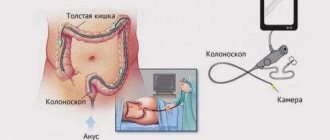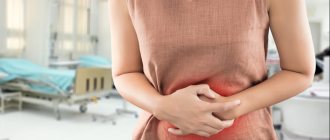With the development of diseases of the gastrointestinal tract, a number of characteristic symptoms can be observed in the patient. If your stomach hurts in the morning, this may indicate the presence of a peptic ulcer, gastritis, etc. However, discomfort in the abdominal area may be associated with overeating, overwork, etc. Therefore, in order to get rid of pain, you need to consult a gastroenterologist and undergo diagnosis and start treatment. If necessary, consultation with a psychologist or nutritionist may be required.
Digestive diseases
The most common cause of abdominal discomfort in the morning is pathology of the gastrointestinal tract. This may be dysfunction of hollow organs - the esophagus, stomach, intestines, as well as diseases of the digestive glands - liver and pancreas. It is also necessary to examine the condition of the gallbladder and spleen.
Other symptoms help you think about gastroenterological pathology:
- bowel dysfunction (diarrhea or constipation);
- nausea;
- burning behind the sternum;
- decreased appetite;
- vomiting of sour contents;
- belching;
- bitter taste in the mouth.
How to independently determine the cause of pain?
It is possible to determine the damage to a particular organ depending on the location of the pain.
- If your stomach hurts in the upper abdomen in the morning, this indicates a pathology of the stomach, small intestine, inflammation of the gallbladder, or pancreatitis. Common causes are peptic ulcer, hyperacid gastritis, gastroesophageal reflux.
- Pain in the right hypochondrium occurs with diseases of the liver, gall bladder, and stomach. If they are paroxysmal in nature, cholelithiasis should be excluded.
- Pain in the left hypochondrium occurs with pathology of the spleen, pancreas, and left stomach.
- The stomach hurts in the umbilical area in the morning, often due to intestinal dysfunction. With pathology of the small intestine, a person complains of bloating and accumulation of gases. Constipation, accumulation of fecal stones, and intestinal overflow cause discomfort in the navel area and below.
Morning pain does not always indicate illness. After a large evening meal, eating heavy food (fatty, smoked foods, flour products), abdominal discomfort and bloating appear. Your organs simply could not cope with the heavy load and did not break down all the food eaten the day before. Therefore, the stomach hurts in the morning due to fermentation and putrefactive processes. Going to the toilet helps solve the problem. To avoid unpleasant sensations, in the future, try not to eat a lot before bed and reduce the amount of food at one time.
Treatment
Therapeutic treatment methods are based on a special therapeutic diet and medications. It is recommended to fast for some time to give your digestive system some rest. After improvement occurs, you should gradually begin to consume foods. It is allowed to eat only what will not overload the intestines. It is worth giving up fried, fatty and smoked foods. All dishes are best baked or steamed.
All food should have the consistency of puree. This will prevent coarse food particles from entering the digestive tract and damaging the affected mucosa. You should eat in small portions, but often. In addition to diet, it is important to take medications like Metoclopramide and Pantoprazole. This will help speed up your recovery.
Hunger pains
Stomach hurts in the morning due to long breaks between meals. People who want to lose weight often suffer from illness. Following the recommendations, they eat at 18:00, and the next meal is often postponed until later in the morning. Pains of this nature quickly disappear after breakfast; sometimes a cup of milk or tea helps relieve symptoms. To relieve pain, you have to eat little and often.
However, you should not attribute discomfort to hunger. Pain always indicates an existing pathology and is a signal that it is time to take active measures. Most likely, the cause is an inflammatory process in the stomach when its internal walls are damaged. Numerous snacks only dull the symptoms, and the disease continues to progress. Do not put off visiting a gastroenterologist if this is your case.
Peptic ulcers, erosions of the stomach and small intestine are also manifested by abdominal pain on an empty stomach. Sometimes patients wake up at 4-5 o’clock in the morning with a “sucking in the pit of their stomach”; in severe cases, the pain is pronounced and brings a lot of suffering. With erosions, sour vomiting occurs, which brings relief. The condition is quite dangerous as it can lead to bleeding and perforation of the mucosal defect.
Folk remedies
If you are sure that there are no various inflammations or pathologies in the body, and your stomach hurts in the morning due to stressful situations or overeating, you can treat unpleasant symptoms at home.
Let's consider the most effective means
Potato juice
. We peel a couple of raw potato tubers and remove their skins and eyes. On the finer side of the grater, chop the vegetable and strain the juice using gauze or a strainer. We drink the resulting liquid (2 - 3 tablespoons) on an empty stomach and after meals throughout the day.
Chamomile
. Before eating, drink 1/5 of the chamomile infusion. Pour boiling water over the dry plant and cover with a lid. Take after the liquid has cooled to room temperature.
carrot juice
. Grate the carrots and squeeze out the juice. Take 1/4 glass of liquid after each meal.
Olive oil
. For severe pain, you can drink a teaspoon of olive oil. It is advisable to use on an empty stomach, 30 minutes before meals.
Cabbage juice
. Grind fresh cabbage leaves through a meat grinder and strain the juice with gauze. It is recommended to warm the liquid to room temperature before use. Drink 1/5 glass three times a day before meals.
Honey
. Dissolve a small amount of flower honey (2 - 3 teaspoons) in a glass of warm boiled water. Take orally three times a day.
https://youtu.be/_NxkWIvDGyQ
What can cause pain in children?
In the evening the baby was happy and healthy, but in the morning he points his finger at his navel and complains of pain? You should measure the temperature, look at the nature of the stool - normal, pasty or liquid. Sometimes the reason for complaints is the child’s reluctance to attend kindergarten or school. And he is not always cunning. If a child’s stomach hurts in the morning, this may be evidence of stress, emotional tension, or problems with peers. In these cases, you can think about neurosis and consult a specialist.
Acute pain is indicated by the characteristic posture of the child - he lies curled up on his side and pulls his legs under him. In such cases, the baby slowly and very carefully changes body position and constantly cries.
Seeing a doctor
Readers are probably wondering: when should you call a doctor? Immediate medical examination is required if acute, cutting pain appears that does not go away when changing body position. You should contact your doctor:
- When the temperature rises (if there is a sharp increase in temperature above 37C or it remains at 37-37.4C for several days);
- Repeated vomiting;
- Lack of urination or a sharp decrease in the amount of urine produced;
- If a child under six years of age is sick.
In other cases, home treatment is sufficient.
Drug treatment may include taking medications:
- Antispasmodics: No-shpy, Drotaverine, Spasmalgona;
- Antibacterial drugs: Enterofuril (for gastrointestinal disorders);
- Enzyme-containing drugs to improve digestion: Festal, Pancreatin, Mezim, Creon, etc.;
- Antipyretics: Ibuprofen, Paracetamol;
- Prebiotic drugs to restore intestinal microflora: Linex, Enterol, Bifidobacterin, etc.;
- Means for restoring salt balance: Regidron or saline solution;
- Sobrentov: Activated carbon, Enterosgel, Polysorb, Smecta, Neosmectin, etc.
You should not self-medicate. A doctor can determine the exact cause of pain based on the results of examinations, tests, and the patient’s medical history. It’s better to go to the doctor (spend only an hour) than to treat serious complications later.
Have you been struggling with GASTRITIS and ULCERS for many years without success?
Diseases that cause a child's stomach pain in the morning
The most common reasons:
- appendicitis;
- food allergies;
- helminthic infestation;
- pancreatitis;
- poisoning;
- intestinal infections;
- digestive diseases.
If your stomach hurts for 2 hours, and the intensity of the pain increases, the temperature has risen, there is no stool, immediately call an ambulance. The child requires immediate consultation with a surgeon. Before the medical team arrives, you cannot take any measures - give the baby painkillers, apply a heating pad to the stomach. Such amateur activities will only dull the symptoms of the disease and prevent the correct diagnosis.
If your stomach hurts in the morning and you have diarrhea, these are signs of an intestinal infection or poisoning. The recommendations here are similar - consult a doctor as soon as possible. Diarrhea in the morning and abdominal discomfort may indicate intestinal dysbiosis. In any case, the child will need to undergo the necessary tests, which will help rule out serious pathology.
Activity of intestinal parasites
If your stomach hurts every morning, and the night before itching in the anal area causes the patient to wake up, intestinal parasites are considered the cause of the symptoms. Parasitic diseases occur in people of any age and social status.
The uninvited guest enters the body in different ways, through:
- Unwashed hands (sometimes touching your face is enough);
- Poorly washed fruits and vegetables;
- Contact with infected animals, their feces or fur;
- Meat or fish that has not undergone proper heat treatment (salty food is also dangerous);
- Contaminated toys, pacifiers for children;
- Oral sex with an infected partner.
Symptoms associated with parasitic infection are:
- Sudden weight loss;
- Decreased or, conversely, sharp increase in appetite;
- Feeling of weakness throughout the body;
- Insomnia;
- Problems with skin, hair;
- Various allergies;
- Nausea, vomiting;
- constipation or diarrhea;
- Increased body temperature.
If a patient suspects the presence of helminths in the gastrointestinal tract, has anal itching, or feels sick, it is worth taking a test for helminth eggs. If the diagnosis is confirmed, the doctor will prescribe antiparasitic drugs and diet.
Abdominal migraine
In children under 14 years of age, a disease called “abdominal migraine” occurs. Abdominal pain appears simultaneously with headaches, is paroxysmal, shooting, cutting in nature and can be quite intense. Usually the baby is not able to indicate the location of their location, since the pain is diffuse. At the same time, other symptoms appear: nausea, vomiting, intolerance to bright light. The skin is pale, beads of sweat are visible on the face. After the attack ends, the symptoms go away on their own.
Food poisoning and chemical poisoning
Poisoning is the most common factor in disorders in the intestines and stomach.
In case of poisoning, severe pain is localized in the stomach area (above the navel). The nature of severe pain can be sharp and cutting.
Symptoms associated with poisoning are:
- Nausea;
- Vomit;
- Complete loss of appetite;
- Insomnia (pain may begin in the very early morning hours).
If poisoning is caused by inhalation of pesticides, the following symptoms are added to the listed symptoms:
- Dizziness, headache.
- Noise and ringing in the ears.
- Coughing and sneezing.
- Difficulty breathing.
When the first symptoms of poisoning appear (if poisoning became known before the onset of severe symptoms), it is necessary to urgently call an ambulance, accurately describing the patient’s condition.
During pregnancy
Often a woman has a stomach ache in the morning during pregnancy, and unpleasant sensations do not always indicate some kind of pathology. While carrying a child, the ligaments attached to the pelvic bones are stretched, which causes discomfort. Typically, such pain is intermittent and intensifies during body movement.
In the early stages, mild pain is felt, and this is considered normal. The reason is the stretching of the enlarging uterus, which puts pressure on the organs adjacent to it. The body adapts to a new state under the influence of hormonal changes. Many women experience nagging pain on the days when menstruation was scheduled to occur.
However, a woman should be careful. When cramping, sharp pain and bleeding appear, immediately go to the gynecological department. Such sensations are harbingers of an early miscarriage or ectopic pregnancy.
Abdominal pain in late pregnancy
In the last months before childbirth, discomfort in the lower abdomen and lower back is caused by training contractions. At this time, the uterus can be easily felt with your hands. Training contractions differ from real contractions in their irregularity; this is simply how the body prepares for the process of childbirth.
Sharp pain in the third trimester may indicate premature birth or placental abruption. Delay in this case becomes dangerous for both the baby and the mother. As long as the amniotic fluid has not broken, the pregnancy can be maintained.
Digestive disorders are quite common and cause stomach pain in the morning from gases during pregnancy. The hormone progesterone relaxes the smooth muscles of internal organs, including the intestines. Constipation and bloating appear. Poor functioning of the gastrointestinal tract organs may be due to pressure on them from a greatly enlarged uterus.
Panic attacks
Overexcitation of the autonomic system is accompanied by the release of the hormone adrenaline. Under its influence, not only do blood vessels narrow, but also an imbalance in the functioning of the muscles of internal organs occurs. They alternately contract, which causes a spasm in the abdomen, and then relax. This causes pain.
Panic attacks also cause a feeling of fear, palpitations, increased blood pressure, diarrhea or constipation, hot flashes, sweating, and a feeling of chilliness. Sometimes a person views the world and his own actions as if from the outside. The disease affects young people and people over 60 years of age.
You should not ignore abdominal pain on an empty stomach, because the most important organs are located here. After all, the body sends signals in this way that there is a problem.











